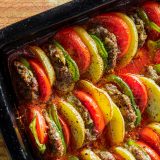I admit, the word traybake makes me think of English cooking, the sort popularized by Nigella Lawson. Throw some ingredients on a half baking sheet, pop it into a hot oven and, voilà, you have dinner.
That misconception was put to rest soon after I walked through the front door of Reem Kassis’ parents’ house in Karmiel, which was built on land that historically belonged to the Palestinian village of Rameh. Kassis was arranging spiced lamb kafta patties with tomato and potato slices in a round cooking pan that was first coated with a raw tomato sauce.
That was it. It came out of the oven in 45 minutes and dinner was served. When Kassis told me that this was not some modern mashup, that the recipe comes from her mother’s friend, Juju, whose family has been making it for generations, I was reminded of how little I know about other cultures and their culinary history.
Kassis and her mother also prepared dishes that I did recognize from the Palestinian canon: sfeeha (meat pies filled with lamb and onion), maqlubeh (a massive upside-down chicken and rice dish), and eggplant fatteh, a yogurt-based dish with fried eggplant.
The only real issue with this traybake was whether the potatoes and kafta need to be precooked. We found that the meat patties worked just fine added raw, but the potatoes did require parbaking so that they cooked fully in the oven and crisped up properly. This was accomplished easily by throwing the sliced potatoes into the hot oven for just 10 minutes before assembling the rest of the dish.
At the Palestinian table, and across Arab cuisines, warm spices are used in savory applications, so we used the cinnamon called for by Kassis as well as allspice in the meat mixture; we opted for a pound of lamb, but you can easily substitute 80 percent lean beef.
Finally, we added garlic to the tomato sauce per Kassis’ suggestion. She also pointed out that minced green chilies could be used as well. So, from a cuisine rooted deeply in the past comes a recipe that most of us think of as being decidedly modern. Something old, something new.
The New/Old World of Traybakes
Christopher Kimball

Get the Recipe
Lebanese Baked Kafta with Potatoes and Tomatoes
This colorful casserole combines savory meat patties with sliced vegetables.
Photo: Connie Miller of CB Creatives; Styling: Christine Tobin





